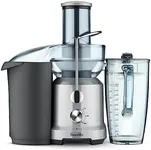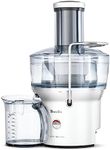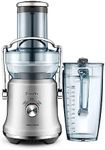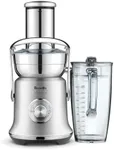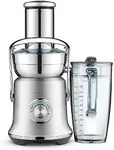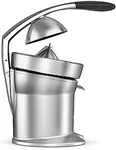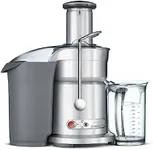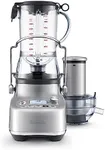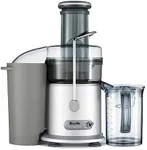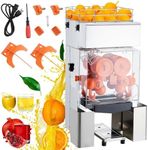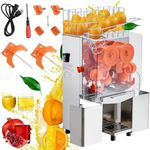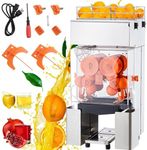Buying Guide for the Best Breville Juicers
Choosing the right juicer can make a significant difference in your juicing experience. When selecting a Breville juicer, it's important to consider your specific needs and preferences. Think about what types of fruits and vegetables you plan to juice, how often you'll be using the juicer, and how much time you're willing to spend on preparation and cleaning. By understanding the key specifications and how they align with your needs, you can make an informed decision and find the best juicer for you.Type of JuicerBreville offers different types of juicers, primarily centrifugal and masticating (cold press) juicers. Centrifugal juicers are faster and more convenient, making them ideal for those who need quick results and plan to juice mostly hard fruits and vegetables. Masticating juicers, on the other hand, operate at a slower speed and are better for extracting juice from leafy greens and soft fruits, preserving more nutrients in the process. Choose a centrifugal juicer if you prioritize speed and convenience, and a masticating juicer if you value nutrient retention and versatility.
Motor PowerThe motor power of a juicer is measured in watts and determines how efficiently the juicer can process different types of produce. Higher wattage means more power, which is beneficial for juicing hard fruits and vegetables. Breville juicers typically range from 700 to 1200 watts. If you plan to juice a variety of produce, including hard items like carrots and beets, opt for a juicer with higher wattage. For softer fruits and leafy greens, a lower wattage juicer will suffice.
Feed Chute SizeThe feed chute size refers to the diameter of the opening where you insert fruits and vegetables. A larger feed chute allows you to insert whole fruits and vegetables without the need for extensive chopping, saving you time and effort. Breville juicers often feature wide feed chutes, ranging from 3 to 3.5 inches. If you prefer minimal prep work, choose a juicer with a larger feed chute. However, if you don't mind spending a bit more time on preparation, a smaller feed chute can still be effective.
Juice YieldJuice yield refers to the amount of juice extracted from a given amount of produce. Higher juice yield means more juice and less waste. Masticating juicers generally provide a higher juice yield compared to centrifugal juicers. If maximizing juice output is important to you, consider a masticating juicer. For those who prioritize speed and convenience over yield, a centrifugal juicer will still provide satisfactory results.
Ease of CleaningCleaning a juicer can be a time-consuming task, so it's important to consider how easy it is to clean the model you're interested in. Breville juicers are designed with ease of cleaning in mind, but some models have more removable parts and dishwasher-safe components than others. If you plan to use your juicer frequently, look for a model with fewer parts and dishwasher-safe options to make cleaning easier. If you don't mind spending extra time on cleaning, you can choose any model that meets your other needs.
Noise LevelThe noise level of a juicer can be an important factor, especially if you plan to use it early in the morning or in a household with noise-sensitive individuals. Centrifugal juicers tend to be louder due to their high-speed operation, while masticating juicers are generally quieter. If noise is a concern for you, opt for a masticating juicer. If noise is not an issue, you can choose based on other specifications.
